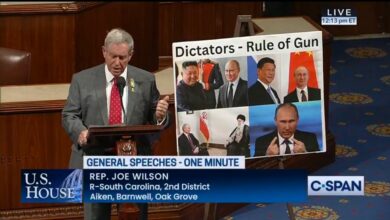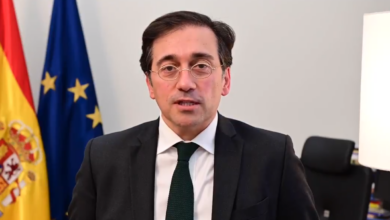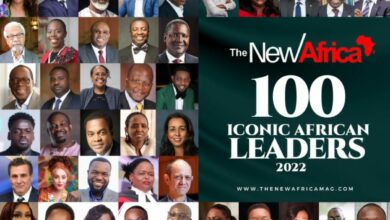Protests erupt in Libya over contact with Israel

Libya – a strong backer of the Palestinian cause – does not recognise Israel, and the meeting has sparked protests in the majority Arab state.
Israeli FM Eli Cohen said the “historic” meeting was “the first step” in establishing relations with Libya.
Israel is working to build closer ties with Arab and Muslim-majority countries which do not officially recognise it.
However Libya’s presidential council, which represents its three provinces, said it was illegal to normalise relations with Israel.
The Speaker’s Office in parliament accused Najla Mangoush of grand treason, and Prime Minister Abdul Hamid Dbeibah has referred her for investigation.
The announcement by Israel that talks had taken place was surprising given that it was not known to be courting Libya, a staunch foe and champion of the Palestinian struggle, especially under former Libyan leader Muammar Gaddafi.
The statement was also unusual in its level of detail, perhaps intended to offset any anticipated denial from the Libyan side – also by identifying and acknowledging Italian foreign minister Antonio Tajani for hosting the meeting in Rome.
On Monday, an Israeli official told the BBC that the meeting was planned in advance and was not a chance encounter, like Libya’s foreign ministry had portrayed it.
The official stressed that the two sides agreed what would be emphasised in the published statement, which he said had been due to be published on Monday but was released on Sunday after the story was leaked to the Israeli media.
Israeli opposition leader Yair Lapid accused the Israeli foreign ministry of being “amateurish [and] irresponsible” and having committed “a serious failure of judgment”.
Another opposition leader, Benny Gantz, accused the Israeli government of doing “everything for PR and headlines, with zero responsibility and forward thinking”.
In his statement on Sunday, Mr Cohen said he met Ms Mangoush last week on the sidelines of a summit, and that they discussed “the great potential for the relations” between Israel and Libya.
He said they talked about Israeli aid in humanitarian issues, agriculture, water management and the importance of preserving Jewish heritage in Libya, including renovating synagogues and cemeteries.
Libya’s Jewish community was one of the most ancient in the world. However it was persecuted by Nazi occupiers in WWII, and tens of thousands fled to Israel in the wake of antisemitic riots and policies in the decades that followed. Gaddafi repressed the tiny community of Jews which remained until there were none left in Libya by the turn of the century.
Contradicting Mr Cohen’s statement, Libya’s foreign ministry said Ms Mangoush had rejected a meeting with representatives from Israel, and what had taken place was “an unprepared, casual encounter during a meeting at Italy’s foreign affairs ministry”.
A statement also said the interaction did not include “any discussions, agreements or consultations” and the ministry “renews its complete and absolute rejection of normalisation” with Israel.
Protests broke out in the capital Tripoli and some other cities following news of the meeting. Roads were blocked, tyres burnt and demonstrators waved the Palestinian flag, though the protests appear to have been relatively small
Libya has been in turmoil for years, with the country split between the interim, internationally recognised government in Tripoli and a rival one in the east.
Should any deal between Israel and Libya be brokered, it would be complicated by that political division, which has existed since Gaddafi’s overthrow 12 years ago.
Gen Khalifa Haftar of the Libyan National Army (LNA) runs the rival government in the eastern coastal city of Tobruk.
In recent years, Israel has pursued formal ties with Arab League countries with which it does not have official relations – from moderate states to historical foes.
Since 2020, it has signed US-brokered agreements known as the Abraham Accords normalising relations with the United Arab Emirates, Bahrain, Sudan and Morocco. The agreements have been met with outrage by the Palestinians, who have accused the Arab signatories of betrayal.
On Sunday evening, Libya’s Presidential Council requested “clarification” from the government over what had happened. The Presidential Council carries out the functions of head of state and is in charge of the country’s military.
A letter from the body said the meeting between the two foreign ministers “does not reflect the foreign policy of the Libyan state, does not represent the Libyan national constants and is considered a violation of Libyan laws which criminalise normalisation with the ‘Zionist entity'”.
It also asked Mr Dbeibah “to apply the law if the meeting took place ».
Aldar : Bbc





